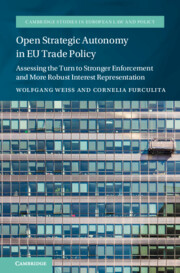 Open Strategic Autonomy in EU Trade Policy
Open Strategic Autonomy in EU Trade Policy A ‘Level Playing Field’ for European Economic Operators in Foreign Public Procurement Markets within International Law Confines?
from Part III - The Tools for Assertive Representation of EU Interests
Published online by Cambridge University Press: 29 November 2024
Chapter 8 is dedicated to the EU’s International Procurement Instrument (IPI) and its aim to ensure access and a level the playing field for EU companies in third countries’ public procurement markets. It introduces the reader to the long-lasting legislative history of the instrument, the causes that lead to the EU’s change of heart leading to its adoption, and describes the final adopted version. The chapter then provides a comprehensive analysis of the IPI’s legality under WTO rules. In particular, the chapter explores the instrument’s compliance with the WTO National Treatment and Most Favored Nations Obligations, and subsidies and dispute settlement rules. Since FTA rules contain similar language to core non-discrimination WTO obligation, the chapter also considers the IPI in light of the bilateral confines. Finally, it considers potential broader political implications of the adoption of the IPI for the EU and European economic operators. The chapter puts forward suggestions for an IPI compliant with EU’s international commitments to avoid accusations of protectionism and to stay true to its multilateralist stance.
To save this book to your Kindle, first ensure [email protected] is added to your Approved Personal Document E-mail List under your Personal Document Settings on the Manage Your Content and Devices page of your Amazon account. Then enter the ‘name’ part of your Kindle email address below. Find out more about saving to your Kindle.
Note you can select to save to either the @free.kindle.com or @kindle.com variations. ‘@free.kindle.com’ emails are free but can only be saved to your device when it is connected to wi-fi. ‘@kindle.com’ emails can be delivered even when you are not connected to wi-fi, but note that service fees apply.
Find out more about the Kindle Personal Document Service.
To save content items to your account, please confirm that you agree to abide by our usage policies. If this is the first time you use this feature, you will be asked to authorise Cambridge Core to connect with your account. Find out more about saving content to Dropbox.
To save content items to your account, please confirm that you agree to abide by our usage policies. If this is the first time you use this feature, you will be asked to authorise Cambridge Core to connect with your account. Find out more about saving content to Google Drive.